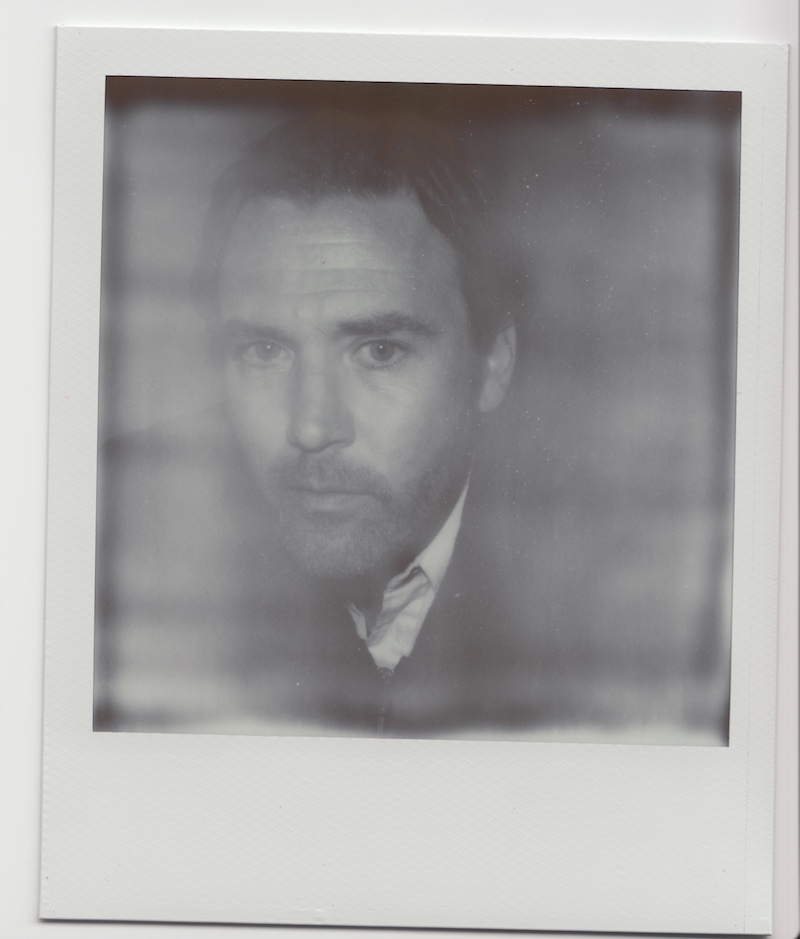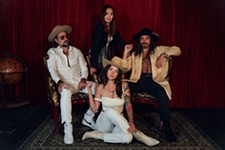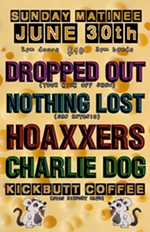Grooving With Cass McCombs
“I don’t think people really understand that my music is experimental”
By Raoul Hernandez, 10:00AM, Wed. Sep. 14, 2016
East Bay Area native Cass McCombs hasn’t done as many interviews as his enigmatic groove poetry demands, but the singer-songwriter-guitarist, 38, laughed easily and often on the dime of his new record label Anti-. The L.A. dweller’s eighth LP Mangy Love, which came out late last month, prompted the call. That and his show at the Parish on Monday, Sept. 19.
Austin Chronicle: My first impression of the new album was that it was a hangover record from your double album opus Big Wheel and Others.
Cass McCombs: [Laughs] Yeah? Whaddya mean?
AC: The hard groove of “Rancid Girl” and then something about “Laughter Is the Best Medicine," I thought, “Man, after the double album, he’s running on fumes." Had anyone else said that to you?
CM: It’s funny you say that, because the impression I got from most people on the last record was that people tried to distance themselves from it. It just didn’t seem to find its audience, that last record.
AC: What was their rationale? Because it’s epic. What were they saying?
CM: I think it did get good reviews. I mean I have a whole list of great reviews from it on our website. Some people like it, though at the end of the day, I don’t really care what other people think. It’s long and people are on the go these days. Maybe it didn’t hit them at the right moment, and they didn’t really have enough time to look back and inspect it. I know first impressions are really important, but some things take a deeper look.
I dunno. Maybe the people that dislike [Big Wheel] are stupid, dunces. I don’t know. I think people forget that not everything you approach do you listen to it in exactly the same way. Sometimes things will hit you immediately, and other times it’ll take a little longer.
AC: What I found remarkable in going back to Big Wheel was its music matte. It’s like jazz-folk. It’s got an über groover pulsating under the compositions. Which isn’t to say it’s a huge departure from your other albums, but why does it stand out so much to me?
CM: [Pause, then laughs] I mean, I’m not quite sure. All I can say is that for myself it was done really quickly, and furiously. From the writing of the songs to recording, it was just one of those things. It made itself. There wasn’t a lot of time to over-think anything, or doubt yourself, or even go back to change things you don’t like. If it’s flawed, we basically made up our minds: “Fuck it. Keep rolling. Keep rolling with the wheel.” It doesn’t matter.
I’m happy with it, because it has that feeling, like, “Don’t stop.” That’s what it says to me: “Don’t fucking stop.” To hell with all that narcissistic worry and anxiety.
AC: Were the other albums more laborious?
CM: No. That’s always been the ethos, my ethos for life. So all the records are like that. Every record from the first EP, we approach it like trying to make a live record. We begin with the whole band playing in the studio, singing the songs. And we cut the song like it’s at a concert, but it’s in a studio. And every so often, something gets flawed. If a lyric is flawed or the bass player misses a change, I’ll keep it on there. With flaws it’s like, “Is it really necessary to fix that? It’s not? Then leave it. Cool.” Some flaws are good.
Like [bassist] Bill Wyman has a flaw in [the Rolling Stones’] “Satisfaction.” There’s one moment where he hits the wrong chord. So if they can do it. The Beatles are messing up all the time. It’s all good if it’s got energy and presence.
AC: How often, when you’re in the studio recording, do you have all the lyrics done versus being in the studio, hitting on a groove, and then just improvising lyrics?
CM: Lyrics are always done first. I don’t know if I’ve ever really changed [a lyric]. Maybe a line here or there. It’s only happened a handful of times where I change a lyric. Lyrics always happen first.
AC: Even before the melody?
CM: Mostly they begin as poems. Words on a page. Then I put music to it. But yeah, lyrics always come first.
AC: I ask because some of your best songs are like a mantra, where you’re basically just repeating a phrase, such as “Crick in My Neck,” “County Line,” “AIDS in Africa.” I was wondering about that style and where it originates.
CM: Umm, it comes from keeping a journal, working with words on a daily basis, and constantly re-editing words. Eventually a rhythm comes from the words, and then the music is easy. Once you have the rhythm of the words, the music can almost be anything. Sometimes I’ll write different songs to the same words.
AC: If the words are the basis, there’s still this larger groove running throughout your work – the connective tissue that unites it all. And yet “groove” has something of a bad connotation in music, like, “Oh, you’ve got no songs.”
CM: I’ve never heard it being derogatory [chuckles]. It’s always been good. Groove is always good. I’ve never heard it be a bad thing. Maybe conservative people don’t like the word. I would just be suspicious of anyone who had a problem with the word, because they’re probably sexually repressed [laughs]. Grooves are good, whether it’s in bed, in the recording studio, onstage, in life.
I feel like a lot of rock these days is conservative. There’s all these silly rules and a lot of negativity. The sex thing is not there anymore. I don’t know who these people are. I’d like to meet them. Punch them in the face.
AC: That’s the thing about groove: You hear a great riff and you never want it to stop. Like the Allman Brothers’ “One Way Out.” It’s this great Elmore James song and riff, but on Eat a Peach, it’s only five minutes where I wish it was “Whipping Post” and clocking in at 20. Is the original version of your song “County Line” 10 minutes?
CM: [Laughs] Live, we always stretch out our tunes. The record version is one version, then the live version is always a different thing. I see it as interpretive. It’s where you are at that moment. There’s no definitive version of any song – Woody Guthrie, whatever. Songs are meant to be in that moment. If you get sick of it halfway through, stop it. You’re under no obligation but your own passion, or interest, or pleasure, or whatever it is that’s driving your reason for playing that song. If the song disgusts you and you’re not feeling it, stop it.
Inversely, if you want to keep playing for another 45 minutes on the same song, then you just gotta do that. And we do.
AC: So here’s another word with a bad connotation, one that’s often construed as synonymous with pretension: Poetry. I’ve been listening to a lot of Doors lately and Morrison was really trying. Few artists do that anymore – spoken word passages and poetry as connective tissue to songs and performance.
CM: I’m not a poet. I’m a lyricist. And a musician. Poetry’s a different world. I do feel music’s been taken over by a radicalized, right-wing contingency under the veil of rock & roll, and I think they’re phony and they don’t know history. And they have pretty right-wing values musically speaking. It’s not about creating a culture of music, where everybody is allowed to express themselves differently, and creating an eclectic musical consciousness across the planet. It’s about enforcing arbitrary laws that only serve an elite group of people just lining their pockets.
I think it’s horse shit, and all this garage nonsense, too. Fucking, if they could just tell me what an augmented chord is, maybe I would respect them, but they don’t know shit. They want to shit on folk music, they want to shit on jazz music, they want to shit on new music. I’m against that.
As far as poetry, the Doors are a great example. Lyrics are definitely a way to provoke people, and on a very simple, human level, get something off your chest. That’s another thing I don’t hear a lot in music these days, is people who are unafraid to put their foot in their mouth. There’s some people who do it, but it’s less and less.
So if you want to say pretentious, I think it’s the opposite. A lot of the music these days that’s trying to make music fun again – Trump says make America great again – is just trying to make music white again. I think it’s a completely racist, imperialistic attitude. It’s not about liberation and letting your freak flag fly. It’s really disconcerting, and I take offense to it.
AC: I’m wondering what your take is on the collapse of the major label system, particularly given what you just said. If music’s become democratized because now anyone can make it, shouldn’t it be far less safe than it seems to be?
CM: Maybe. It sounds logical even if it’s not what’s happened. The first thing that comes to mind is Negativeland’s No Business album, in which they have their manifesto included in the record. There’s this massive essay that talks about the public domain. In it, they begin with a quote by Woody Guthrie, where he’s saying, “Who wrote this song? Do with it what you want. Re-write it, change it, yodel it, sing it. Do anything you want to it. We wrote it and that’s all we really wanted to do. This song belongs to everybody.”
So yeah, the major label thing. That’s before my time, in a way. I grew up listening to that, but when I started playing out, around ’92, major labels were at their apex. Yet there was never the remotest possibility that any of my music would have made it to that world. Nor were we making music that would appeal to a broader audience. We always wanted to make experimental music. I don’t think people really understand that my music is experimental. It’s all about perception, where you're standing at in history. It’s really hard to have that God’s view on music. It’s impossible really.
AC: You’ve said your music’s experimental, which is perhaps why I’ve always been hard pressed to spot definitive influences in it. Who are they?
CM: Where to begin? I’m a huge music listener and collector. I’ve always loved the Beatles. My guitar playing comes from Doc Watson and Elizabeth Cotton, and of course [Jerry] Garcia.
AC: Funny, when we were talking about groove I was going to ask if you’re a Grateful Dead fan.
CM: Oh, of course. I grew up with that shit. We grew up going to their shows. That’s completely my family.
AC: This may be really far afield, but when I first heard “AIDS in Africa,” there was something about your moan that reminded me of Paul Westerberg. Were you ever a Replacements fan?
CM: You know, I’ve heard that, but only recently have I even learned about the Replacements. At that time, I had no idea.
AC: I was struck by a lyric in “Prima Donna” from 2009’s Catacombs, where you say – and I’m paraphrasing slightly – “What is it about this stinking world that likes to see beauty suffer”? As an artist, is that the way you’ve felt?
CM: No, I have nothing but gratitude to be able to perform with people. That’s a character. That’s not me. None of my songs are me. They’re always from the voice of a character. When you put all of the voices together, they start to make up who I am, or any singer for that matter. People are way bigger than their art anyway.
With that song specifically, that’s a Dorian Gray reference, obviously. And it’s a character that’s been exploited through her art. From that character’s perspective, it’s very easy to imagine her being naturally distrustful of industry, business, yet she still goes out that night and performs and brings the house down, because that’s what she does.
AC: In the end, it didn’t take but a few spins to come around to Mangy Love, which is perfectly in line with the rest of your catalog. And “Cry” is one of your prettiest riffs ever.
CM: I had a riff kicking around for years, and it would be something that we would launch into in the middle of a jam. It’s a motif that’s melodically really easy to fall into from any key, because it’s just relative minors, so if you’re jamming with people, it’s a cool thing if you’re hanging on a major chord or a minor chord. You can always find that riff in whatever key.
As for the song, I don’t really know how the song came out of that. But the riff is just this classic, kind of obvious thing. I’m not sure if I stole it from somebody else [laughs].
A note to readers: Bold and uncensored, The Austin Chronicle has been Austin’s independent news source for over 40 years, expressing the community’s political and environmental concerns and supporting its active cultural scene. Now more than ever, we need your support to continue supplying Austin with independent, free press. If real news is important to you, please consider making a donation of $5, $10 or whatever you can afford, to help keep our journalism on stands.
June 28, 2024
June 14, 2024
Cass McCombs, Rolling Stones, Billy Wyman, Jerry Garcia, Grateful Dead, Jim Morrison, Doors, Paul Westerberg, Replacements, Doc Watson, Elizabeth Cotton, Dorian Gray










